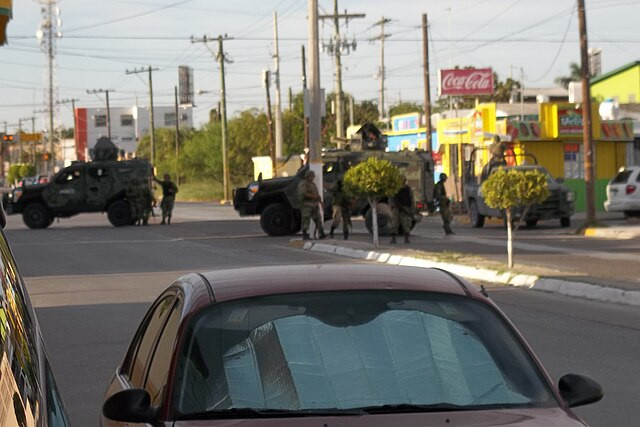The Trump administration on Wednesday formally designated eight Latin American crime organizations as foreign terrorist organizations, a move that intensifies pressure on cartels operating across the U.S. and Latin America. The designation, which applies to groups including Mexico's Sinaloa Cartel, El Salvador's MS-13, and Venezuela's Tren de Aragua, will be published Thursday in the Federal Register, according to a notice from the administration.
The decision follows a Jan. 20 executive order signed by President Donald Trump, who has made border security a cornerstone of his administration's policy. The new designation allows U.S. law enforcement agencies to pursue financial penalties, restrict transactions, and prosecute individuals or organizations that provide material support to the listed groups.
The move extends a terrorism label traditionally reserved for organizations like al-Qaida or the Islamic State to crime syndicates whose primary activities include drug trafficking, migrant smuggling, and violent territorial expansion. The administration argues that these groups' international networks, operational structures, and violent tactics warrant their classification as terrorist entities.
"This designation sends a strong message that these violent organizations-responsible for fueling the drug crisis and human trafficking-will face the full force of U.S. counterterrorism laws," a senior administration official said.
Cartels Named as Terrorist Groups
The eight designated organizations include six based in Mexico and two operating in El Salvador and Venezuela:
- Sinaloa Cartel (Mexico) - One of the oldest and most powerful cartels, controlling vast portions of the U.S.-Mexico border and dominating fentanyl production and smuggling into the U.S.
- Jalisco New Generation Cartel (Mexico) - Known for its hyper-violent tactics, including attacks on Mexican authorities using explosive drones and ambushes on government officials.
- Gulf Cartel (Mexico) - Operates along the eastern U.S.-Mexico border, engaged in drug and human trafficking.
- Northeast Cartel (Mexico) - A remnant of the infamous Los Zetas, known for its relentless violence in northern Mexico.
- La Nueva Familia Michoacana (Mexico) - A group with influence over Mexico's lucrative avocado industry, controlling production through extortion and intimidation.
- United Cartels (Mexico) - A coalition of criminal groups in west-central Mexico, heavily involved in synthetic drug production.
- Tren de Aragua (Venezuela) - A rising criminal organization specializing in migrant smuggling, human trafficking, and extreme violence, now posing a threat in U.S. cities.
- MS-13 (El Salvador) - A violent street gang that originated in Los Angeles and later spread throughout Central America, known for brutal killings and drug trafficking.
Concerns Over Economic and Diplomatic Fallout
The decision has drawn sharp criticism from Latin American officials and business groups, who warn it could have unintended economic and diplomatic consequences. Mexican President Claudia Sheinbaum voiced concerns about potential U.S. extraterritorial actions in Mexico but acknowledged the importance of tackling criminal financing.
"If they make this decree to investigate even more in the United States the money laundering and the criminal groups that operate in the United States, that carry out those drug sales, it's very good," Sheinbaum said. "What we do not accept is the violation of our sovereignty."
Some analysts caution that applying a terrorist label to cartel activity could complicate trade, financial transactions, and cross-border commerce. The cartels' influence extends beyond narcotics, with criminal groups deeply embedded in industries such as agriculture, retail, and shipping. U.S. businesses or banks engaging in transactions-knowingly or unknowingly-with individuals or entities linked to the cartels could face prosecution under anti-terrorism laws.
Security experts also note that past U.S. sanctions against foreign organizations have resulted in supply chain disruptions and restrictions on food imports. In Michoacán, for example, cartel control over avocado exports has previously led to threats against U.S. agricultural inspectors.
Cartels' Expanding Role in Global Crime
The U.S. Drug Enforcement Administration (DEA) has pointed to the growing sophistication of these criminal organizations, many of which now engage in cyber-enabled money laundering, cryptocurrency transactions, and partnerships with international criminal networks. The Sinaloa Cartel, for instance, imports fentanyl precursors from China, manufactures the drug in Mexico, and traffics it into the U.S., contributing to tens of thousands of overdose deaths annually.
Meanwhile, groups like Tren de Aragua have expanded their influence across the Americas, taking advantage of mass migration from Venezuela to embed themselves in illicit economies across Chile, Peru, Colombia, and the U.S. Authorities say the gang has developed a sophisticated system of laundering money through cryptocurrency and is now active in several American cities.
Trump has long highlighted MS-13 and, more recently, Tren de Aragua in speeches about the dangers of illegal immigration. His administration has linked cartel activity to the ongoing border crisis, arguing that the groups facilitate migrant smuggling, extortion, and recruitment efforts targeting vulnerable individuals.






